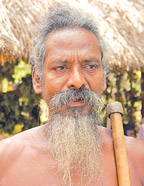|
International Day of the World's Indigenous People:
People who are more connected to nature
World's indigenous people are unique
communities with historical continuity and cultural kinship as societies
common to their original territories prior to larger connected
civilizations. They have their own cultural sovereignty and
self-determination though they are called as minorities or non-dominant
sectors within majorities
Aravinda HETTIARACHCHI
Indigenous People's traditional social values and customary ties
along with the effort to pass on knowledge to their future generations
make them exist in recognition as a people of desire who live according
to natural character of earth with their own social systems of culture
and law. Yet today, to an extent, these communities have been
internationally recognized with respect and dignity to their identities
such as Kayapo, Sami, Negriotos, Veddahs, Maya and etc who lived around
the Africa, the Americas, Asia, Europe and Oceania.
|

Kiri Koraha - pleading and worship to the deities. Pictures
by Susantha Wijegunesekera |
The adjective of 'indigenous' has a meaning as 'from or of the
original origin.' This means the origin of its territory, race, history,
survival lifestyle and etc. Thus indigenous people have a more
restrictive interpretation with it formalized, legalized and academic
vocabulary. Consequently, we need a more reasonable condition to
recognize these beings whose biological bodies are similar to anyone in
the so-called civilization.
First of all the total population of the world's indigenous peoples
are very difficult to compile due to difficulties of identification and
insufficiency of available data. Yet the raw estimate says it is in the
range from 300 million to 350 million (this is fewer than six percent of
world's population) with 5000 distinct people in 72 countries as
estimate of the start of 21st Century.
This population has undergone a dramatic decline in certain area due
to relocation, migration, forced settlements, transformation of culture,
loss of permanent language, loss of land, violation on traditional
territories and lifestyles.
|

Viswakeerthi Vanaspathi Uruvarige
Vanniela Eththo |
The common characters of indigenous people could be indicated with
the meanings such as non-urbanized, nomadic, pastoral, hunting and
gathering, horticultural and etc. Therefore, the connection and the
inter-reaction between the indigenous communities and the non indigenous
societies become complex with lot of relational contradictions because
the 'civilized' society always centered with its economic base the urban
capital.
This urban capital or its cities always functions according to the
mechanical productions itself. The people who spend their life and
labour to these machineries and the people who are connected to these
machines' centered labourers (us) are totally different from these
nature and earth centered indigenous people.
Thus it is not only a contradiction between the indigenous and
non-indigenous. It is also a contradiction between the man-made
machineries and the natural earth.
Thus, the cultural transfer to each other would work out only through
a reasonable human seeking. Being a majority or being temporary powerful
in material and machines is not a weapon to have the upper hand and to
rule over them crowning ourselves as the rulers to decide everything.
There should be similar status given to both parties for the indigenous
are more connected to the natural Chakras of earth. |



